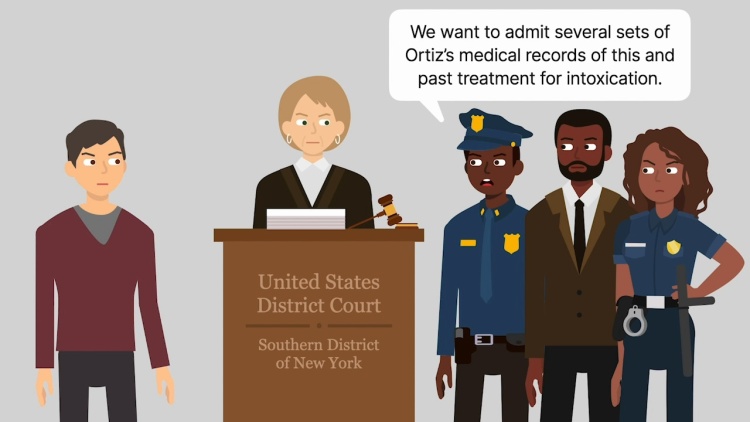Ortiz v. City of New York
United States District Court for the Southern District of New York
No. 15CV2206 (DLC) (2017)
- Written by Abby Roughton, JD
Facts
On June 1, 2014, New York City police officers (defendants) had Hector Garcia Ortiz (plaintiff) taken to the hospital by ambulance. Records from the hospital indicated that Ortiz was intoxicated and violent. Ortiz brought an action against the officers and the City of New York (defendant) under 42 U.S.C. § 1983, alleging that he was not intoxicated on June 1 and that the officers wrongfully assaulted and seized him. The city and officers denied assaulting Ortiz and argued that he was intoxicated and combative at the time. In support of their argument, they sought to introduce the records from Ortiz’s June 1 hospitalization and two follow-up visits, as well as other medical records that showed that Ortiz had also received treatment for intoxication on four other occasions before and after June 1, 2014. The city and officers wanted to use the medical records to show that Ortiz chronically abused alcohol, which they argued was relevant to both the jury’s assessment of Ortiz’s conduct on June 1 and his general credibility, his general awareness and recollection, and his damages claim. The city and officers claimed that the medical records from Ortiz’s pre-June 1 treatment were admissible under Federal Rule of Evidence 404(b) to show that Ortiz had knowledge that he acted dangerously when he was intoxicated. The city and officers also asserted that the records were admissible as habit evidence to show that Ortiz had a habit of drinking so excessively that he had to be hospitalized.
Rule of Law
Issue
Holding and Reasoning (Cote, J.)
What to do next…
Here's why 907,000 law students have relied on our case briefs:
- Written by law professors and practitioners, not other law students. 47,100 briefs, keyed to 996 casebooks. Top-notch customer support.
- The right amount of information, includes the facts, issues, rule of law, holding and reasoning, and any concurrences and dissents.
- Access in your classes, works on your mobile and tablet. Massive library of related video lessons and high quality multiple-choice questions.
- Easy to use, uniform format for every case brief. Written in plain English, not in legalese. Our briefs summarize and simplify; they don’t just repeat the court’s language.





